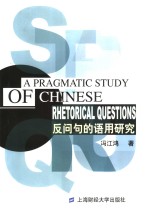图书介绍
反问句的语用研究pdf电子书版本下载

- 冯江鸿著 著
- 出版社: 上海:上海财经大学出版社
- ISBN:7810981986
- 出版时间:2004
- 标注页数:250页
- 文件大小:7MB
- 文件页数:265页
- 主题词:汉语-句法-研究
PDF下载
下载说明
反问句的语用研究PDF格式电子书版下载
下载的文件为RAR压缩包。需要使用解压软件进行解压得到PDF格式图书。建议使用BT下载工具Free Download Manager进行下载,简称FDM(免费,没有广告,支持多平台)。本站资源全部打包为BT种子。所以需要使用专业的BT下载软件进行下载。如 BitComet qBittorrent uTorrent等BT下载工具。迅雷目前由于本站不是热门资源。不推荐使用!后期资源热门了。安装了迅雷也可以迅雷进行下载!
(文件页数 要大于 标注页数,上中下等多册电子书除外)
注意:本站所有压缩包均有解压码: 点击下载压缩包解压工具
图书目录
前言 1
Abstract 1
Chapter 1 Introduction 1
1.0 Introduction 1
序 1
1.1 The rationale of the present study 3
1.2 Problems with the existing studies 5
1.3 Objectives of the present study 6
1.4 Methodology 7
1.5 Outline of the study 8
2.1 Studies on Chinese rhetorical questions 10
2.1.1 Rhetorical approaches 10
Chapter 2 Review of Relevant Literature 10
2.0 Introduction 10
2.1.2 Grammatical approaches 12
2.1.3 Pragmatic approaches 16
2.2 Overseas studies of rhetorical questions 33
2.2.1 Rhetorical approaches 33
2.2.2 Linguistic approaches 34
2.2.3 Pragmatic approaches 39
2.3 Summary 44
3.1 Methodology in the present study 46
Chapter 3 Research Methodology 46
3.0 Introduction 46
3.2 Description of the data 48
3.3 Summary 49
Chapter 4 Identification and Interpretation of Chinese Rhetorical Questions 51
4.0 Introduction 51
4.1 Theoretical background of the present approach 51
4.2 The identification of Chinese rhetorical questions 64
4.2.1 Previous definitions of Chinese rhetorical questions 65
4.2.2 Distinctive features of Chinese rhetorical questions 69
4.2.2.1 The discrepancy between the form and the Communicative function of rhetorical ques-tions 70
4.2.2.2 The polarity shift between the rhetorical ques-tion and its implied answer 78
4.2.2.3 The multiplicity in the communicative function of rhetorical questions 80
4.2.2.4 The indirectness and implicitness of rhetoricalquestions in conveying ideas 83
4.3 The interpretation of Chinese rhetorical questions 90
4.4 Summary 94
Chapter 5 Responses to Chinese Rhetorical Questions 97
5.0 Introduction 97
5.1 An overview of the previous approaches to answerhood 98
5.1.1 Kiefer's pragmatic approach to the study of answers 99
5.1.2 Grewendorf's practical application of the probability and decision theories to the study of answers 102
5.1.3 Stenstr?m's conversation-and discourse-analytical approach to the study of answers 103
5.1.4 Ilie's pragmatic study of the adequacy of answer-hood 105
5.1.5 A classification of responses to questions 109
5.2 Responses to rhetorical questions 111
5.2.1 An overview of response types 112
5.2.2 Types of responses to rhetorical questions 116
5.2.2.1 Implicit vs.explicit answers to rhetorical ques-tions 118
5.2.2.2 Explicit answers vs.replies to rhetorical ques-tions 122
5.2.3 Types of explicit answers to rhetorical questions 124
5.2.3.1 Addresser's answers to rhetorical questions 125
5.2.3.2 Addressee's answers to rhetorical questions 129
5.2.4 Types of replies to rhetorical questions 135
5.2.4.1 Addresser's replies to rhetorical questions 136
5.2.4.2 Addressee's replies to rhetorical questions 145
5.2.4.2.1 Acknowledging vs.non-acknowledging ad-dressee's replies 146
5.2.4.2.2 Addressee's replies conveying agreement vs.disagreement 148
5.2.5 Non-verbalized responses to rhetorical questions used as assertives 155
5.2.6 Responses to rhetorical questions used as directives 157
5.3 Redefining rhetorical questions 161
5.4 Summary 163
Chapter 6 Rhetorical Questions as Discursive and Argumentative Acts in Talk Shows 167
6.0 Introduction 167
6.1 About talk shows 168
6.1.1 Talk shows as a semi-institutional discourse 169
6.1.2 The question-response sequence in talk shows 171
6.2 Discursive characteristics of rhetorical questions in talk shows 177
6.3 The pragma-dialectical approach to argumentation 202
6.4 Argumentative use of rhetorical questions in talk shows 208
6.4.1 Argumentative patterns of rhetorical questions intalk shows 208
6.4.2 Rhetorical questions that function as standpoints 214
6.4.3 Rhetorical questions that function as arguments 217
6.5 Summary 219
7.0 Introduction 222
Chapter 7 Conclusion 222
7.1 Summary of the findings 223
7.1.1 Major findings in the identification of chinese rhe-torical questions 223
7.1.2 Major findings in the responses to Chinese rhetorical questions 224
7.1.3 Major findings in the investigation of Chinese rhe-torical questions as di scursive and argumentative acts in talk shows 228
7.2 Theoretical and practical implications 229
7.3 Limitations of this study 231
7.4 Suggestions for future research 232
Appendix 1 Sources of rhetorical questions in the corpus 233
Appendix 2 Secimen analyses of rhetorical questions in corpus 235
Bibliography 239